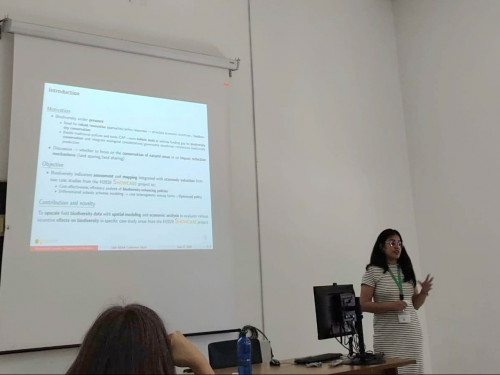SHOWCASE partner Monserrath Lascano from University of Bologna (UNIBO) presented early-stage research on integrating biodiversity conservation with agricultural productivity, as part of SHOWCASE, at the OpenDistal dissemination event organised by the University on 20 September, 2024.
Lascano's work, which focuses on the use of flower strips in stone fruit orchards specifically in Andalusia, builds on key findings from Fabrizio Ungaro from the Institute of BioEconomy (CNR IBE) under SHOWCASE. Ungaro’s research has demonstrated that flower strips significantly increase biodiversity, improving agricultural productivity by increasing the efficiency of natural pollination while also enhancing the presence of pollinators like bees and spiders, as well as boosting the biodiversity of vascular plants.
Ungaro’s work further focuses on explaining how flower strips create critical habitats for pollinators and improve soil quality, which contributes to greater farm resilience and enhanced agricultural productivity. Furthermore, flower strips are a sustainable and effective solution that does not compromise crop yields. In Andalusia, data from 36 agricultural plots was analysed, comparing biodiversity indicators before and after the introduction of flower strips. Data collected over two growing seasons (2022-2023) showed an increase in the abundance and richness of wild bees, spiders and vascular plants. Using machine learning models such as Random Forest, they predicted the impacts of flower strips on biodiversity at a territorial scale and developed spatial models to understand changes in species distribution in response to agri-environmental measures.
In her presentation, Lascano expanded on these findings by introducing the ongoing economic analysis of these measures, aiming to evaluate the effectiveness of different incentive models, including action-based payments and result-based incentives. While the economic work is still in progress, Lascano highlighted the potential for result-based incentives to provide a more efficient way of promoting biodiversity-friendly practices among farmers. As further mentioned by Lascano, biodiversity protection should not be seen as a cost, but as an investment for the future.
Overall, her presentation underscored the importance of integrating biodiversity conservation into agricultural practices, aligning with Ungaro’s findings that flower strips can serve as a powerful tool for enhancing both biodiversity and productivity in farming landscapes.
Image: Monserrath Lascano presenting at Open Distal event, University of Bologna
